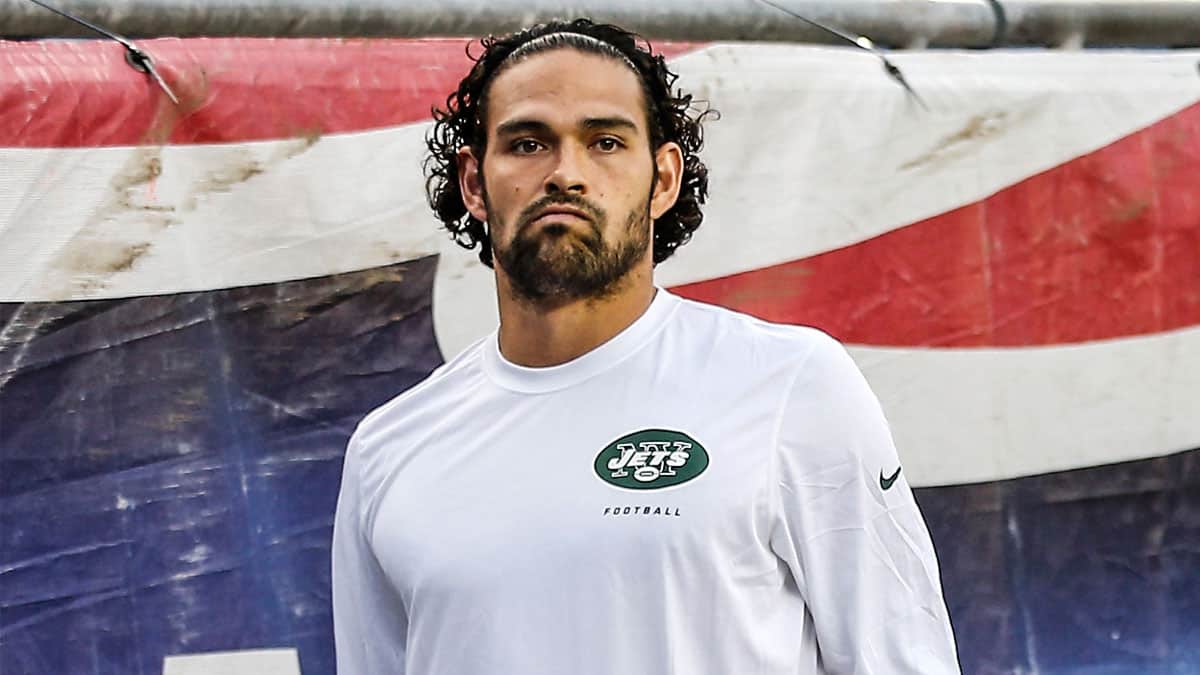A pair of AFC title game appearances couldn’t save former New York Jets QB Mark Sanchez from a dubious distinction bestowed by PFF.
Pro Football Focus couldn’t wait until spring to conjure up draft day nightmares.
The analytic statistical service filled the doldrums of the NFL offseason with terror after unveiling the draft worst pick over the last 15 years for the New York Jets and their brethren. New York’s nominee, per Michael Renner, is quarterback Mark Sanchez, the fifth overall pick of the 2009 proceedings.
Renner admits that there is “a lot of good content to choose from” when it comes to the Jets’ most dubious draftees. He lists defensive dropouts Dee Milliner and Vernon Gholston as nominees and is tempted to put Sanchez’s eventual successor Sam Darnold in the spot.
However, Renner praises the Jets for earning a sizable haul from trading Darnold and thus removes him from consideration.
Sanchez isn’t so lucky.
“Sanchez, however, took a lot of draft capital to secure via trade,” Renner writes. “(He) quite easily cost one of the best rosters in the NFL a chance at a Super Bowl.”
To Renner’s point, the Jets traded with the Cleveland Browns to select the USC product, moving a dozen spots ahead through the deal. Cleveland obtained the 17th and 52nd overall picks as well as veterans Kenyon Coleman, Brett Ratliff, and Abram Elam.
While it’s more than fair to say that Sanchez had his struggles—ones made all the more painful by future Pro Bowlers B.J. Raji, Brian Orakpo, Malcolm Jenkins, and Brian Cushing going within the next ten picks—calling him the ultimate comedy of the Jets’ draft day errors seems excessive.
Following the circulation of PFF’s selection on social media, many were quick to note that Sanchez helped guide the Jets to the AFC title game in each of his first two seasons at the New York offensive helm. While it’s fair to perhaps label Sanchez a game manager in the postseason affairs, working in conjunction with strong defensive and rushing efforts, he was far from the only reason the Jets failed to advance to the Super Bowl.
The first time around, Sanchez actually helped the Jets built a 17-6 first half lead over Indianapolis (a lead built through two Sanchez touchdown passes) before momentum shifted through an 80-yard Colts drive capped off by a Peyton Manning touchdown pass. It began a 24-point onslaught for the Colts, who put 461 yards of offense in the 30-17 victory.
One year later, Sanchez threw three touchdown passes in the Divisional victory over New England before falling just short of erasing a 24-0 deficit in the next conference title game in Pittsburgh. He had two more scoring passes (both in the second half) as the Jets fell in a 24-19 final.
Sanchez’s 95.5 passer rating over the 2010-11 postseason was second-best amongst playoff quarterbacks with at least 50 attempts, behind only future Super Bowl MVP Aaron Rodgers.
Additionally, it’s not as if the Jets missed out on another franchise man later in the draft. Matthew Stafford was the consensus top pick to Detroit while Tampa Bay ironically took Kansas State’s Josh Freeman with the 17th pick, which was the Jets’ original selection obtained in another deal with the Browns.
The other throwers (Pat White, Stephen McGee, Rhett Bomar among them) made little to no impact on the NFL level. In fact, the last quarterback taken (Julian Edelman out of Kent State) went on to make his mark as a receiver instead.
Sanchez at least has the distinction of throwing NFL passes, something second-round choice Christian Hackenberg (2016) was never able to do.
Geoff Magliocchetti is on Twitter @GeoffJMags


